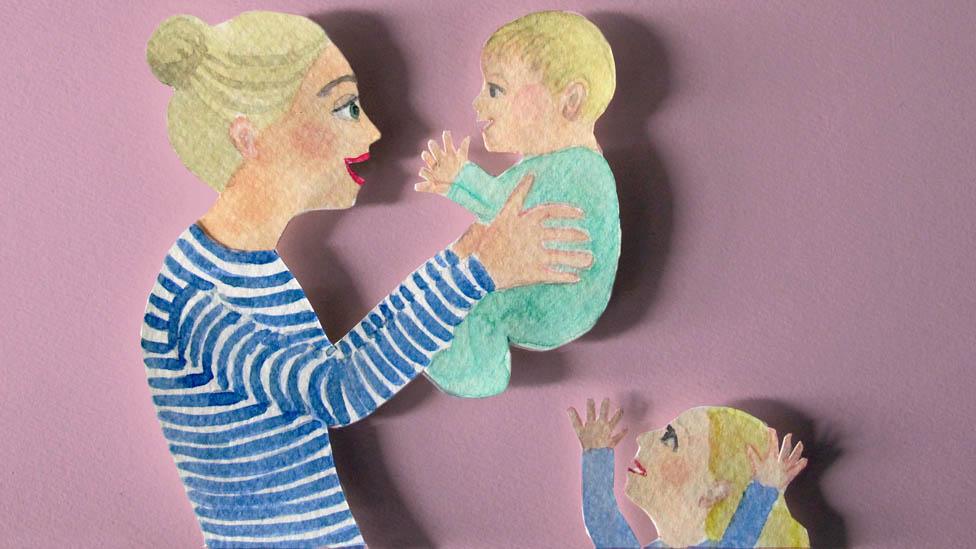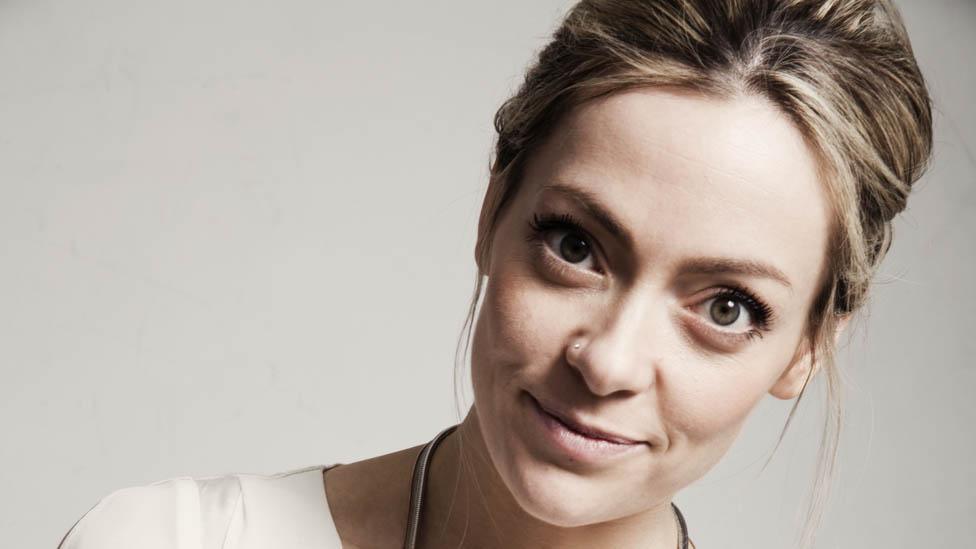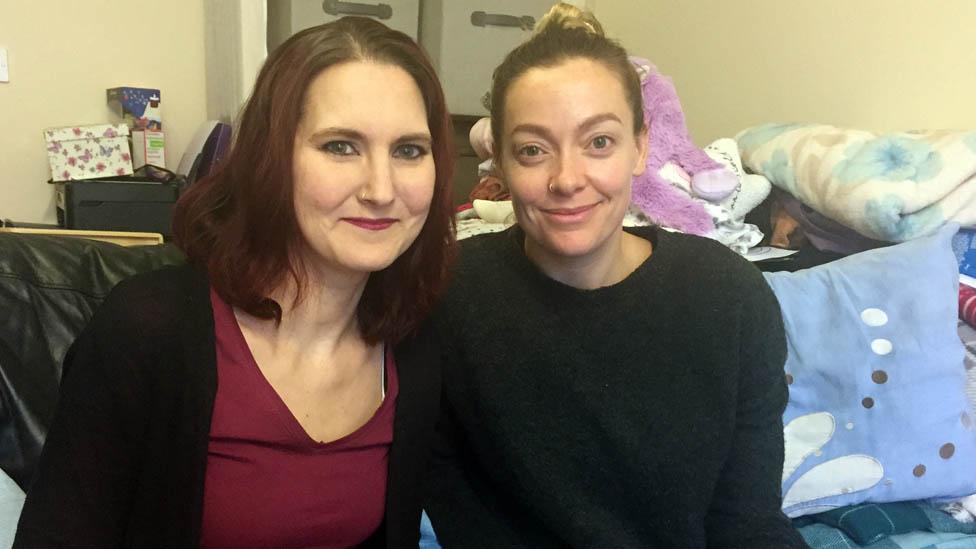Cherry Healey: 'How being a single mum shattered my prejudices'
- Published

Single mothers have often been stigmatised and denounced. Cherry Healey explains why she's proud to be one.
I'm a single mum. I'm glad I live in an age and a place where it's OK to admit that.
We have moved on so much, so fast. Once, Margaret Thatcher deemed, external a single parent family so bad for a child that she felt it was better for the mother and child to be removed and placed within a religious group.
When I first heard that, I felt such unbelievable pain and heartbreak for all those young mothers that were pressured into following this advice.
And it would have had many ripples of pain for the family as a whole.
The judgement of others is a powerful thing and people will do unfathomable things to avoid bringing shame onto themselves and their families.
And this is the judgement that I want to see gone. Completely.

Cherry Healey
Yes we have progressed - but even today there is such an insipid, damaging view of single parents that we need to keep revisiting it until single parents feel free of useless, ignorant judgement - and instead receive respect as parents and support if they, and therefore their child, needs it.
Sadly, even in 2017 I felt the cold wind of judgement when I became a single parent. It's hard to know whether the judgement I felt comes from society or whether it comes from myself. I think it is a bit of both.
I hate to admit this, but I had a negative view of single mums before I became one. As I grew up I heard, read and watched society's depiction of The Single Mum, and it certainly wasn't positive.

Find out more
Cherry Healey meets women who fought to prove that being a single mum doesn't have to mean being a bad mum in her documentary The Single Mum Thing.
You can listen to Cherry's entire single parents series for BBC Radio 4's Woman's Hour on the programme's website.

Comedy sketches depicting single mums smoking cigarettes and drinking cider in the park while neglecting their babies, endless newspaper stories about single mothers on benefits draining the system, statements from politicians about the connection between "Broken Britain" and one-parent families - all fed my prejudice gremlin until one day, I too was a dreaded single mum. And I began to question everything I'd ever consumed about this subject.
I was happy to discover that I was the same person. I was a good parent as a married woman and I was a good parent as single mother.
Money was tighter but my ability to maintain order at home, get homework done on time and love my children had not changed.
Separating and re-establishing my life was difficult but I felt so hugely grateful that at least I was able to pay the bills thanks to my job - and it made me realise that there is so much stigma attached to being a single mother. At exactly the time when the single parent needs support and help, they are stigmatised and judged.
It also made me realise that for many of us there is a strong, not very flattering stereotype of The Single Mum. And so I wanted to break free from that and give a voice to some single parents that haven't been heard before.
And I'm glad to say that any prejudice, both conscious and subconscious, was gradually eroded.
I spoke to Kirsty, a single mother with a terminal illness, who smashes the traditionalist's argument that it's better to stay in an unhealthy marriage, regardless of the circumstances. Even though she was suffering and weak from cancer, she did not regret leaving her relationship and was happy that her daughter's environment was at least peaceful.

Kirsty with Cherry
She acknowledges that it was hard caring for her daughter alone: "I definitely still have guilt over it. There are times at bedtime when she'll cry for her daddy."
But she still feels it was the right decision. She is now able to co-parent with her partner in a more harmonious way. Her message that together is not always best for the child, even in such a challenging situation, was powerful.
I also spoke to Meena, whose story moved me profoundly.
Knowing that she would be disowned by her family, Meena made the decision to leave her husband as the environment had become so toxic that social services had been involved.
"I come from an Asian background so divorce or separation - that's a no-no," she tells me.
"I was expected to remain in the marriage and make it work and just put up with it," she says.
"If I go to a family function I get looked at like a demon with two horns."
Chris Hart: 'They were all shocked when I said I was keeping the baby'
I was given, and desperately needed, a huge amount of emotional and logistical support from my family during my separation, and it's hard to image the impact the removal of that would have had on my mental state and therefore the indirect impact on my children.
Without financial, emotional or logistical support, Meena began a new life with her child, with the help of her flexible work shifts as a train driver.
The resilience was startling but the grace was profound. Even after being rejected by her family, at exactly the moment she and her daughter needed care, she was still working towards a reconciliation for the sake of her daughter's future.
When I think about the negative single-mother narrative in the 90s and subsequent reduction of support, and increase in single-mother stigma, it made me feel extremely angry that as a society we leave incredible mothers like Meena fighting against such a huge tide.
And for others, the term single parent felt like a strange fit. Rupa (not her real name), an accident and emergency consultant, had decided to go it alone and conceive via a sperm donor. There was nothing "broken" about it, a term often placed on to a single parent. It had been carefully considered and planned for.
Rupa recalls: "We met once before the first insemination, and then the next time he came round and donated, and then showed himself out while I was just chilling out in my own bedroom, playing music, and you know he left me a little pot on the stairs and showed himself out."
I spent the morning in her house watching her beautiful, happy daughter play and cuddle her mother.
Again, I struggled to understand why anyone would assume single mothers can't offer as much love and security to a child as a two-parent family.
Join the conversation - find us on Facebook, external, Instagram, external, Snapchat , externaland Twitter, external.
